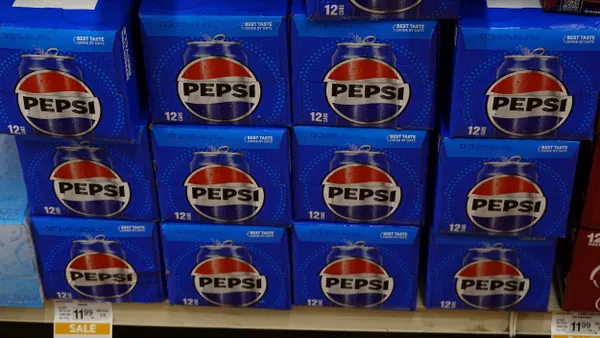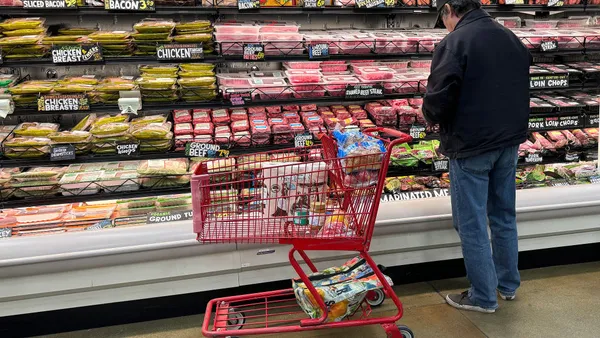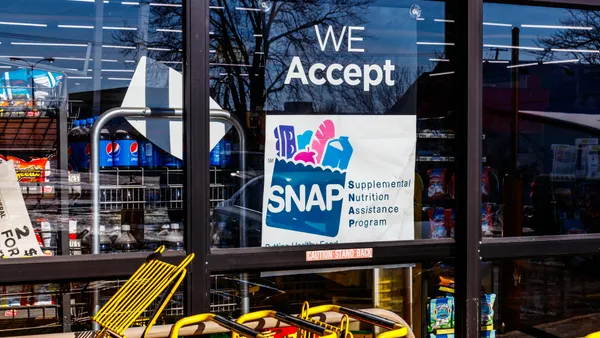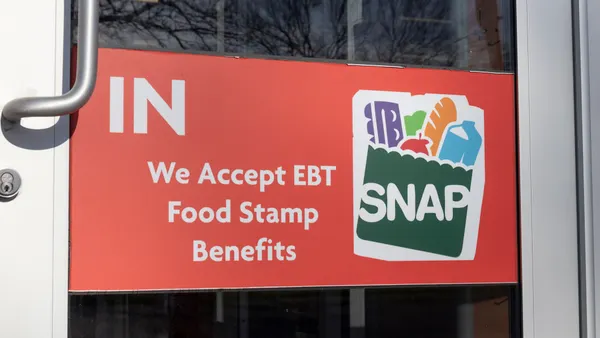Dive Brief:
- Frozen food will continue to be in high demand even after the coronavirus crisis subsides, according to a new survey from the American Frozen Food Institute. Half of those who purchased frozen foods since the onset of the crisis say they will purchase a lot more (18%) or somewhat more (32%) in coming months.
- The frozen foods segment has seen a spike in sales with 70% of consumers increasing frozen food purchases since March. New customers have come to the category too, with 7% of consumers who previously, rarely or never purchased frozen foods pre-pandemic currently buying these products.
- The most frequently purchased items were vegetables, meat and pizza. The survey found the top reasons for buying these options are the long shelf-life of frozen foods (60%), consumer desire to stock up in case of food shortages (58%), enabling consumers to limit trips to the grocery store (51%) and the ease of preparation (46%).
Dive Insight:
Frozen food’s popularity has been on the rise for several years and the coronavirus outbreak seems to be the catalyst that defrosted some of the lingering negative perceptions that offerings from the freezer section are unhealthy and low-quality — at least for the near future.
Although AFFI expects this sales rise to continue after the pandemic, analysts aren't as sure. Analysts at Bernstein said last month that consumption of shelf-stable and frozen packaged foods could only be temporary and these increases may not affect U.S. food companies’ full-year sales.
The continued growth of frozen food sales will likely depend largely on the speed at which the U.S. economy picks up. The AFFI report noted that part of the increase in demand for these products stems from the quarantines. While these habits are bound to change eventually, the economic consequences of the nation’s quarantine measures may continue to bolster frozen food purchases. Frozen food is often seen as an economical choice for shoppers that performs well during recessions, Eric Penicka, U.S. research analyst at Euromonitor, previously told Food Dive.
Companies have worked to develop more healthy frozen options in recent years that has helped the category grow after facing struggles. Nestlé, B&G Foods, Conagra and General Mills have spent significant amounts of time and money updating packaging and introducing dishes that incorporate more premium and plant-based ingredients to target changing consumer tastes. During the pandemic, it is likely that many new customers sampled these updates as three-quarters of frozen food shoppers experienced out-of-stock tags for their preferred frozen items, prompting two-thirds of them to choose different frozen food items and 72% to select alternative brands.
The survey showed the categories with the largest growth for the four weeks ending April 5 were frozen meat (101%), frozen snacks (82.3%) and frozen beverages (94.6% ). These preferences indicate that consumers were not only relying on frozen options for staples like meat that were weathering hardships in the fresh supply chain, but also for convenience — a boon during the pandemic as restaurant options have been limited.
Going forward, convenience may be the saving grace that creates continued customer patronage for the frozen food aisle. With the survey showing that so many consumers were obliged to select different brands and meals than they typically would, brands like Lean Cuisine, Healthy Choice, Frontera, Green Giant and Marie Callendar's will benefit from having a variety of their meals reintroduced to American homes.
As so many of these choices were recently updated to feature more healthful selections while maintaining convenience, it is probable that these meals found a warm reception in households that are increasingly looking for convenient, healthy options that are easy to prepare.
The survey also found that Gen Z consumers and high-earning millennial households with children, who were previously not big frozen food purchasers, increased their buying of frozen products substantially during the pandemic. Across all generations, there is a chance this surge in the purchases of frozen food during a crisis will create loyal customers.









